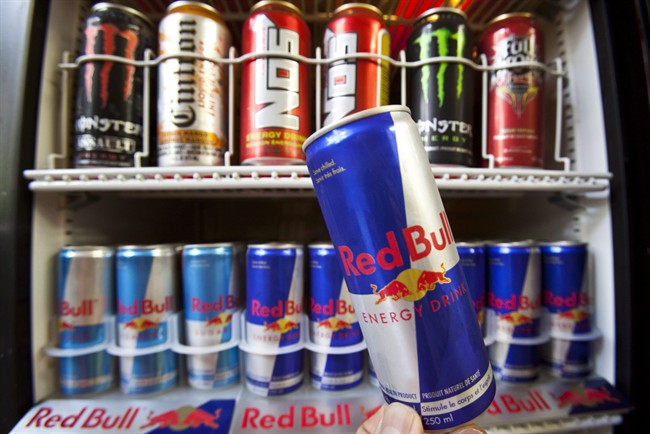OTTAWA – The federal government’s new rules limiting the caffeine allowed in so-called energy drinks will affect just a fifth of the market, Health Canada officials say.

Most of the energy drinks such as Red Bull and Monster already meet the new requirements to keep caffeine levels at 180 milligrams per drink.
All energy drinks will still have to change their labelling to meet new Health Canada requirements to list ingredients and analysis of the amount of caffeine and vitamins.
And all the drinks will have to carry a warning that they are not recommended for children or pregnant or breastfeeding women and should not be mixed with alcohol.
But officials say only about 20 per cent of the market will need to actually reduce the amount of caffeine so that it meets the new 180-milligram cap. That’s about as much caffeine as in a medium cup of coffee.
The limits are much more lenient than the 80-milligram cap suggested by an expert panel, and opposition critics accused the government of catering to industry at the expense of children’s health.
“Why won’t the minister respect these expert guidelines to protect our children’s health? Why is the minister siding with the industry instead of telling them to stop marketing to children?” said NDP health critic Libby Davies.
But Health Minister Leona Aglukkaq says her decision to tread lightly is a “balanced approach” that warns consumers about the dangers of caffeine-loaded drinks while also allowing them free choice.
- B.C. to ban drug use in all public places in major overhaul of decriminalization
- 3 women diagnosed with HIV after ‘vampire facials’ at unlicensed U.S. spa
- Solar eclipse eye damage: More than 160 cases reported in Ontario, Quebec
- ‘Super lice’ are becoming more resistant to chemical shampoos. What to use instead
“I firmly believe that it’s up to individuals and parents to make their own decisions when it comes to what they eat and drink,” she told reporters. “That’s why our focus is on giving people the information they need to make good, informed decisions.”
The rules are a response to long-standing concerns that the heavily-marketed, caffeine-loaded beverages are being over-consumed by teens and tweens who don’t understand the potential side-effects.
The changes are a far cry from the recommendations proposed recently by an expert panel convened by Aglukkaq.
The panel wanted Health Canada to treat the drinks as medication, label them as “stimulant drug-containing drinks” and allow sales only from behind the pharmacist’s counter.
The panel also wanted to limit consumption to those over 18.
“Many of these newer ‘energy’ drinks are, in reality, oral delivery systems for stimulant drugs such as caffeine,” the experts said in their report.
The panel urged the government to treat the products as a medication, with explicit warnings about adverse reactions such as insomnia, anxiety and heart palpitations.
It noted that caffeine in low doses is known to cause restlessness, anxiety, nervousness, insomnia and irritability. At high doses, it could cause delirium, vomiting, neuromuscular tremors and convulsions.
While the experts said the risks are generally low, consumption of the drinks is so high that action is required. It pointed to reports of sudden deaths after consumption of the drinks, as well as seizures.
The panel also recommended that the government make an effort to differentiate between caffeine-laden drinks and sports drinks such as Gatorade and other electrolyte-replacement beverages that are considered safe for children.
The caffeinated energy drinks have taken off in recent years, with brands multiplying on store shelves. Health Canada estimates about seven million of them are consumed every month in Canada.
They usually contain about the same amount of caffeine as a couple of cups of coffee, but the effects on teenagers and the effects of the drinks when mixed with alcohol have not been properly explored, the panel said.
Similarly, it’s not clear exactly how caffeine interacts with other herbs and additives contained in the drinks, the panel said.
The drinks need to be considered drugs, not foods, the report urged.
“In the absence of real therapeutic and medically indicated benefits, the panel considers that the risks associated with the use of these drugs outweigh the benefits,” it stated.
In background documents, Health Canada said it went against the advice of the panel because it was just “one of the critical elements” in dealing with the drinks.
The Canadian Beverage Association cites evidence that finds no clear link between adverse reactions and energy drinks. And it says energy drinks should not be singled out since they are just as safe as coffee or tea.
The federal lobbyists’ registry shows the department and the minister were lobbied on the subject by Red Bull Canada Ltd., the Canadian Beverage Association and Coca-Cola Refreshments Canada Co.
Aglukkaq is putting the regulations out to the public for a 30-day consultation. After that, Health Canada will spend six months co-ordinating a transition with the industry, with the expectation that everyone will be compliant within 18 to 24 months.
Officials are also asking the industry to come up with a voluntary code of service that would examine how it markets its products to young people.



Comments